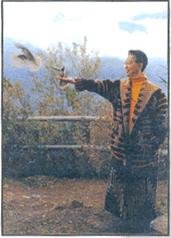Tolerance lies right next to Hate |
"I don't want to be tolerated," said the
brown skinned woman during the Non-Profit Assistance Center workshop.
"Tolerance lies right next to hate."
Grandmothers' Home | Si Kazili Home |
She didn't know Taqseblu, Grandmother Vi Hilbert, elder of the Upper Skagit tribe. The young woman would not have heard Taqseblu sometimes say "Oh sho sho baud" (phonetic spelling) in response to hearing about someone's struggles. The phrase translates to "Oh, poor thing" and could mean a genuine empathy. But its meaning could be not so benign when you consider the often heard teaching "To pity someone is to hate them".
This sentiment is a reminder of how to treat others with respect from the cultural perspective of many indigenous nations located in the Northwest's Puget Sound region. It is expected you are intelligent. That you have multiple levels of intelligence that operate simultaneously. That you are skilled or can learn the skills to take care of your own life. That everyone has been given a gift by Creator to hold on behalf of all humanity. You are not the owner of that gift, but rather the designated guardian. As caretaker, you respect your gifts and wisely apportion them ethically for the betterment of community.
Respect, recognition and acknowledgement you practice every day on your way to becoming an elder. You do not look past someone or turn your back (unless you are doing so to show the design of the button blanket you are wearing). After recognizing, you speak acknowledgement of their contribution and skills. This is how you show respect.
In contrast, Western Art experts categorize African, Oceania and First Nation art as "primitive". Western Science ascribes there are "primitive" living skills but no science. These notions persist despite evidence to the contrary. Lost wax method of metal casting existed in Africa long before Europe. Sophisticated psychology and governance led to a thousand years of peace with the People of the Longhouse on the eastern coast of what is now known as the United States. "Primitive" is the Western way of looking past or ignoring the gifts of another people; of saying "Oh sho sho baud".
But now, slowly, Western Science is proving out Indigenous Science in business, psychology, philosophy, healing and other areas.
All Si Kazili
resources are culturally competent. We recognize and acknowledge the contributions
of many people. We are not ashamed to learn from others. We recognize
we are in the land of the peselth, the potlatch, the give-away. The traditions
are compassion and sharing. It is not "high class" to take someone's
self respect. To say "poor thing." To merely tolerate instead
of respect, recognize and acknowledge.

|
|||
|
|||
|
"We honored the land that we had been given to take care of … some very wise people are just now beginning to get the message. 'Oh, oh, we better listen to the First People of this land. They have important things to teach us.' So this is what some very wise people are trying to do now. Trying to learn from the First People of this land …" Vi
Hilbert, Our Living Ancestors, 2003 |
|||